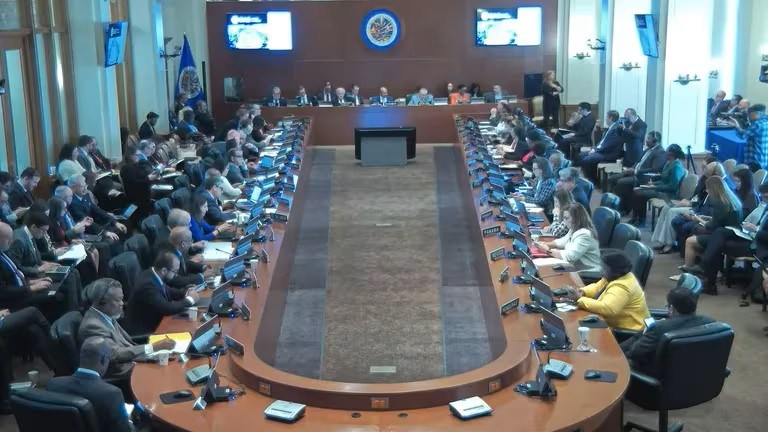
HAVANA TIMES – The Permanent Council of the Organization of American States (OAS) approved on April 11th, by a wide majority, the predictable “strong condemnation” of the violent police incursion ordered by the Ecuadorian government against the Mexican embassy in Quito to kidnap former Ecuadorian vice president Jorge Glas.
The resolution, which in its seventh paragraph urged dialogue between the two governments to overcome the conflict “constructively”, was described by the digital magazine *La Palabra Abierta* from Quito as an example of the OAS’s “mattress diplomacy” (softening the fall of the punished), at a time when numerous events indicate perhaps the worst moment in inter-American relations.
Back in 1954, during the civic events held on Mondays in Chilean public schools, alongside the national anthem, the anthem of the Americas was also usually sung in chorus, whose first stanza says: “A song of friendship, / of good neighborliness, / will keep us united eternally, / for our freedom, for our loyalty, / we must live gloriously.”
While the childish voices sang with enthusiasm, in Guatemala, the United States government was organizing the coup that overthrew President Jacobo Arbenz, and in general, military dictatorships were multiplying in the hemisphere, accompanying Washington in its anti-communist crusades under the seal of the Cold War.
Despite the vicissitudes of Latin American democracies during the 20th century, in recent decades, the American continent has been able to display a “good neighborliness” with minor disputes between states, resolved by arbitration and negotiations, in contrast to other areas of the planet, which are scenes of continuous armed conflicts.
More polarization, less freedom
This good neighborliness is crumbling through diplomatic channels, and, contrary to the Americas anthem, it is expressed in attacks on freedoms, where human rights are gradually regressing, suffocated by authoritarian governments, even if they are emanating from the ballot box, which trample international law to subordinate it to internal interests or geopolitical gambles, in a context of increasing Latin American polarization.
The violent police invasion of the Mexican embassy in Quito on the night of Friday April 5th, with the abuses against chargé d’affaires Roberto Canseco, was the final straw. The right of asylum, one of the dearest institutions of international law, while registering previous episodes of conflict in the region, had never been violated so openly.
The only vote against the OAS resolution was from Ecuador, whose president, Daniel Noboa, showed a singular willingness to normalize the currently broken relations with Mexico, stating that he will not revoke the kidnapping of former Vice President Glas, because “justice is not negotiable.”
The defiant attitude of the young right-wing president was described from Brussels by former President Rafael Correa (2007-2017) as a maneuver of internal politics in light of the referendum scheduled for the 21st of this mont


